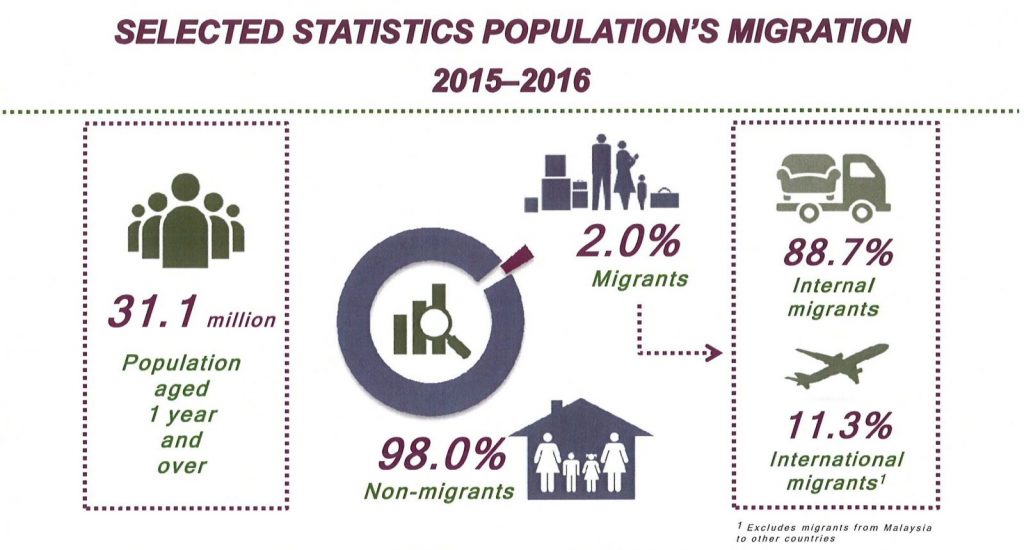Human Migration in Malaysia

As undergraduates, we are prone to many global issues that may affect the economy of our country and our future. One of the main problems in our country, Malaysia, is the human migration problem. However, this problem can be solved if the causes are identified in the early stages. Human migration is a huge issue that affects our country’s economy and standard of living. In the next part of my blog, I will discuss the causes and consequences of human migration.
Human migration is the act of people moving from one place to another with hopes of settling down in the new location permanently. This is not a fresh or foreign concept to humanity as these activities can be traced back to the opening of the involuntary slave trade in the 18th century or even the moving of the huge masses of people during the World Wars that was done in the hope of escaping the destruction and unnecessary bloodshed. Just like in the past, migration continues to be an inescapable phenomenon faced by developed and developing countries. People from countries that are underdeveloped or have political complications continue to seek a new place to call home. While the migrants certainly play an important role by contributing a number of a whopping 2.07 million legal foreign workers, almost half of the Malaysian workforce (not including the undocumented immigrants), foreign labor in Malaysia is the leading cause of an increase in crime rates, unemployment and currency inflation (Chu, 2015).
One of the leading causes of the incursion of migrants in Malaysia today is due to weak law enforcement. Many immigrants have entered the country without the proper papers, and thus creating several issues for Malaysians. The absence of local enforcement that punishes those who enter the country illegally is somewhat a puzzling thing. Those upholding the law should always punish those who break it. Lack of law enforcement made them think that they are superior to the rules, and hence resulting in an outburst of contracting migrant workers for various reasons (Kanapathy, 2006). For one, employers also prefer migrant workers who readily accept any form of labor at a price lower than most locals request. Secondly, with the weak law enforcement, migrants will enter and leave as they please, seeking for promising job prospects. This is especially the case for states like Sabah and Sarawak in Malaysia where migrants can enter the country faster. An estimated 300,000 irregular migrants hail from Sabah, which shows a high intake of illegal workers (Kanapathy, 2006). This indicates that the government has not taken law enforcement seriously as there still exist many migrants without the necessary paperwork living and working in Malaysia.
Political factors usually cause people to migrate from their country of origin to another country. Persecution of political rights is one of the principal reasons why people leave. Based on a study done by Jayden Mathews (2017), persecution includes the badgering, segregation, and torment of individuals who cannot help contradicting their legislature, have minority religious convictions or ethnic groups. Since conditions in their nation are perilous, these people are compelled to relocate to more secure countries. Looking for shelter is an immediate consequence of the surge of political migrants from an abusive state to a more lawfully based nation (Mathews, 2017). Malaysia is not an exception. As of May 2017, based on statistics done by the UNHCR, there are a total of 150,200 refugees and asylum-seekers from Myanmar registered with UNHCR in Malaysia (The UN Refugee Agency Malaysia, 2017). Therefore, political issues are one of the main factors that force people to migrate to other countries, usually by force due to persecution and unstable political background.
Besides that, the attitudes of locals are also one of the root causes of mass immigration. The majority of locals refuse to work in harsh environments namely construction sites, factories, and operating hawker stalls. They prefer higher-paying office jobs since manual labor also means dirtying their hands. As the number of locals who prioritize status and self-image increases, the demand for unskilled workforce continues to rise exponentially as do the qualifications for jobs that have an oversupply of graduates. Thus, the unemployment of fresh graduates continues to occur and the immigration of foreign workers remains unresolved.
The influx of migrants is also a threat to the health of locals. They are a contributing factor to the discovery of new diseases and the resurgence of previously controlled illnesses. Even legal immigrants who claim to have medical certifications by their country of origin, may at times be handing in false or unreliable information due to inefficient health screening facilities in their respective homelands. It has been disclosed by the Foreign Workers’ Medical Examination Monitoring Agency (Foreman) that 10% of immigrants subjected to health examinations are suffering from infectious illnesses such as Tuberculosis (TB), Hepatitis B and AIDS (BERNAMA, 2016). These diseases are infectious. It easily spreads to locals and leads to overall health deterioration of society. Recent insights reveal that TB, one of the most recent disease outbreaks in our nation is quickly ascending, with a passing rate significantly higher than dengue. There were around 20,000 instances of TB announced among local people with more than 1,000 fatalities annually (Malaysian Digest, 2014). Hence, the inundation of foreign workers has not only brought about unfavorable economic consequences but also influenced the national wellbeing and health for the worse.
Furthermore, another grave consequence of the flocking in of immigrants is the worrying increase of crime rates each subsequent year. According to Hyoji (2007), the total crimes involving foreign workers is about 2%, with a ratio of 3.8 crimes per 1000 immigrants as opposed to 2002. Rise in crimes such as snatch thefts, robbery, kidnapping, and sometimes even murder is partially behind the multitude of undocumented immigrants. Being undocumented, these immigrants may resort to committing crimes for quick money while the police are rendered helpless without a documented fingerprint to trace. Kanapathy (2008) agrees that the majority of foreign workers threatens the society because it is related to the increase in the crime rate. Therefore, the drastic increase in crime rates is caused by the incursion of foreign immigrants.

Clearly, the cons of foreign immigration outweigh the pros of keeping them around. A study by the Immigration Department of Malaysia reveals that the number of foreign workers has already exceeded the ethnic Indian population. If matters are not quickly handled, it could also well overtake the number of Chinese locals in a couple of years, possibly leading to political instability (Chu, 2015). To counter the surplus of immigrants, the only solution the government can turn to is to remove the overwhelming need for the unskilled workforce. To do so, the government needs to encourage the mechanizing of all sectors of the economy. Since most foreign workers are here to fill up places that locals refuse due to the unpromising prospects, mechanization will greatly reduce the need for unskilled foreign laborers as a single machine and operator can well outdo several men. For instance, laying a thousand standard bricks – a task that costs two bricklayers the better part of the day- only takes a Hadrian X, a brick-stacking robot, an hour to complete (Shewan, 2017). Whilst foreign labor is reduced, modernization and technological advancement help the country flourish in terms of economic productivity and social development while encouraging locals to pursue high-skilled jobs, hastening the country’s development. If properly implemented, with the government providing the incentive for pioneers and entrepreneurs of these sectors to mechanize their ways, we may be well looking at a steady decline in the need for foreign workers, restoring the country’s population percentage to a balanced state once more.
Just as the rise of foreign labor yields fruitful short-term growth, it may not be beneficial to the country in the long run. As mentioned before, mass immigration is also responsible for the spike in health issues and crime rates in the country which, if it persists, may give the country a negative label – not to mention an overpopulation could lead to a political overturn. It is evident that the issue of foreign immigration needs to be taken into serious consideration before it worsens. If we have the government cooperation in mechanizing all sectors of the economy, then we will be avoiding a lethal bullet, the shattering of our country’s peace and economy. We may be looking towards a more progressive advancement towards the dream of one day becoming a First World Country.
